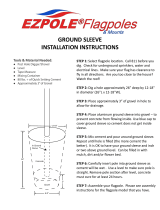
ratings.Replacementtiresshouldhavethesame
orbetterratings.Formoreinformationgoto
http://www.nhtsa.gov/Vehicle+Safety/Tires.
Note:RefertoSpecications(page12)andensurethatall
replacementtiresmeetorexceedtheratingsforthismachine.
Contents
Introduction..................................................................2
Safety...........................................................................3
SafeOperatingPractices...........................................3
SafetyandInstructionalDecals.................................6
Setup............................................................................8
1InstallingtheTowPole..........................................8
2InstallingtheSafetyChain......................................9
ProductOverview..........................................................9
Controls................................................................9
Specications........................................................12
Operation....................................................................12
PreparingtoTowtheMachine..................................12
TowingtheMachine...............................................16
PreparingtoUsetheMachine...................................17
OpeningandClosingtheCowl.................................17
AddingFuel...........................................................18
CheckingtheEngineOilLevel.................................19
StartingandStoppingtheEngine..............................20
UsingtheMachine..................................................22
MixingtheMaterial.................................................22
UsingtheDrum.....................................................23
Maintenance.................................................................24
RecommendedMaintenanceSchedule(s)......................24
PremaintenanceProcedures........................................24
PreparingtheMachineforMaintenance.....................24
RemovingandInstallingtheDividerPlate..................24
Lubrication...............................................................25
LubricatingtheMachine..........................................25
LubricatingtheDriveChain.....................................25
EngineMaintenance..................................................26
ServicingtheAirCleaner.........................................26
ChangingtheEngineOil.........................................27
ServicingtheEngineOilFilter..................................28
RemovingandInstallingtheEngine..........................29
FuelSystemMaintenance...........................................29
ServicingtheFuelSystem........................................29
DriveSystemMaintenance.........................................31
ServicingtheReductionCase...................................31
ServicingtheDriveChain........................................31
Cleaning...................................................................32
CleaningtheMachine..............................................32
Storage........................................................................33
StoringtheMachine................................................33
Troubleshooting...........................................................34
Safety
Improperlyusingormaintainingthemachinecanresult
ininjury.Toreducethepotentialforinjury,complywith
thesesafetyinstructionsandalwayspayattentiontothe
safetyalertsymbol,whichmeans:
Caution
,
W ar ning
,
or
Danger
—personalsafetyinstruction.Failureto
complywiththeinstructionmayresultinpersonalinjury
ordeath.
SafeOperatingPractices
Thisproductiscapableofamputatinghands.Alwaysfollow
allsafetyinstructionstoavoidseriousinjuryordeath.
WARNING
Machiningorhandlingstone,masonry,concrete,
metal,andothermaterialscangeneratedust,mists,
andfumescontainingchemicals,suchassilica,
knowntocauseseriousorfatalinjuryorillness,
suchasrespiratorydisease,silicosis,cancer,birth
defects,orotherreproductiveharm.
•Controldust,mist,andfumesatthesource
wherepossible.Watershouldbeusedfordust
suppressionwhenfeasible.
•Usegoodworkpracticesandfollowthe
recommendationsofthemanufactureror
suppliers,OSHA,andotheroccupationaland
tradeassociations.
•Alwaysfollowrespiratoryprecautions.
•Whenthehazardsfrominhalationcannotbe
eliminated,theoperatorandanybystanders
shouldweararespiratorapprovedbyOSHAfor
thematerialbeinghandled.
WARNING
Engineexhaustcontainscarbonmonoxide,an
odorless,deadlypoisonthatcankillyou.
Donotruntheengineindoorsorinanenclosed
area.
Training
•ReadtheOperator'sManualandothertrainingmaterial.If
theoperator(s)ormechanic(s)cannotreadorunderstand
theinformation,itistheowner'sresponsibilitytoexplain
thismaterialtothem.
•Becomefamiliarwiththesafeoperationoftheequipment,
operatorcontrols,andsafetysigns.
•Alloperatorsandmechanicsshouldbetrained.The
ownerisresponsiblefortrainingtheusers.
3
























